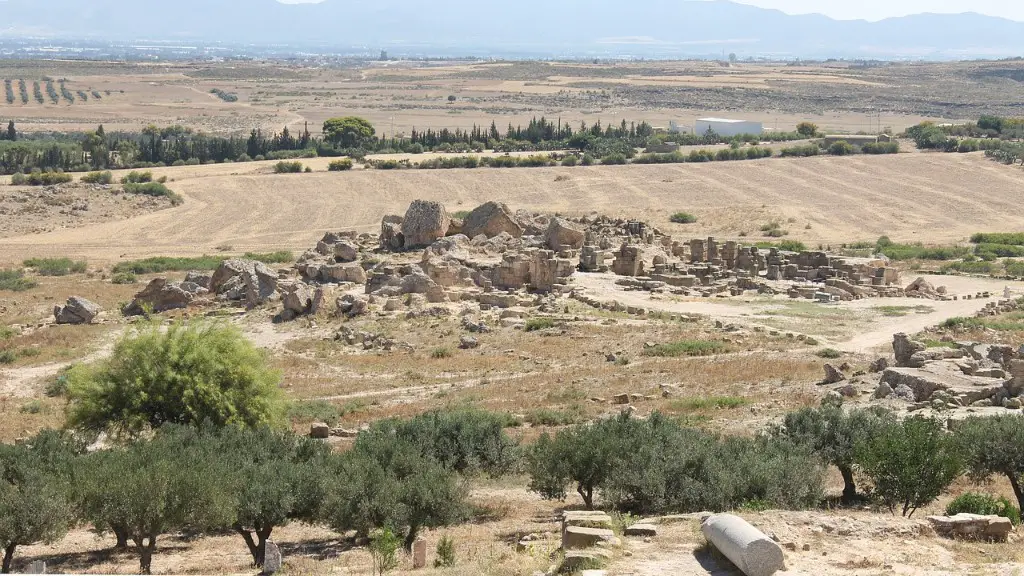Gladiators played an important role in Ancient Rome. They were professional fighters who trained and competed for public entertainment, primarily in the Roman Coliseum. Although they were often slaves or captives, they were also respected warriors who sometimes earned their freedom. Gladiatorial games were one of the main sources of entertainment in Rome, with thousands of spectators in attendance.
Gladiatorial contests were also associated with religious ceremonies and rituals, and were used to honor the gods and goddesses. Thus, gladiators were seen as heroic figures and their matches signified social divisions in Ancient Rome. The games also showed off the Roman Empire’s triumphs: since many of the gladiators were captives, every victory was an example of the strength of the Roman Empire.
Gladiatorial games were highly organized, with specific rules and regulations. There were certain regulations on how to treat gladiators after they were defeated, and both weapons and armor were restricted to certain types. The most popular type of match was a death match; if a gladiator was found to be weak, or was unable to defeat his opponent, he was killed.
In addition to fighting in the arena, gladiators also performed in military parades and public shows. This provided a great opportunity for Roman citizens to witness the power of their empire. Gladiators also occasionally served an entertainment role in private homes and taverns.
The effects of gladiators on the Roman Empire have been debated for centuries. On one hand, they were symbols of strength and power, and provided a valuable source of social entertainment. On the other hand, some argue that because of the brutality of their matches, the gladiatorial games helped to desensitize Roman citizens to violence.
Gladiatorial Education
Gladiators were extensively trained to become proficient fighters. They were taught how to use weapons and armor, and how to defend themselves in the arena. Gladiators also trained in various martial arts, such as wrestling, fencing and throwing. In most cases, gladiators had to be highly skilled in order to survive in their matches.
But gladiators were also trained in more than just combat. They were taught rhetoric, music, and classical literature, allowing them to become more rounded and educated fighters. This gave them the ability to address the cheers, cheers, or jeers of the crowd. It also allowed them to be more skilled in diplomacy, which was important for those gladiators who wished to win the favor of their captors and gain their freedom.
Gladiators also often belonged to different fighting styles, or “schools”. The most famous of these schools was the Ludus Magnus, based in Rome. Here, gladiators learned about weapons, armor, and strategies for the arena. They supplemented this knowledge with regular philosophical and religious education.
Everyday Life
Life for gladiators was often harsh and difficult. They lived in dormitories, away from their families, and were subjected to strict disciplinary measures. They were also subject to the whims of their masters, and were often mistreated and exploited.
In spite of this, gladiatorial life was not without certain pleasures. They often performed in pairs, and so had the opportunity to form friendships and alliances. Gladiators often shared meals, and had access to certain luxuries, such as baths and massage. Gladiators were also given the opportunity to bet on their own fights, which allowed them to earn additional money.
In addition to these concerns, gladiators were also subject to public opinion. They could gain fame and respect, but were also subject to criticism and ridicule. Gladiators had to be careful about how they presented themselves to their audience, as their reputation was an important factor in their career.
End of Gladiatorial Games
The popularity of gladiatorial games began to decline at the end of the 4th century AD. This was mainly due to the rise of Christianity, which viewed gladiatorial matches as barbaric and immoral. In addition, public opinion had begun to turn against the games, as some viewed them as an outdated form of entertainment.
In AD 404, the Roman Emperor Honorius officially banned gladiatorial contests in the empire. This marked the end of a long era of gladiatorial games. Although these matches were violent, they are now seen as important historical events and a symbol of the Roman Empire.
Economic Impact
Gladiatorial games also had an economic impact on the Roman Empire. Gladiators were expensive to train, maintain, and replace, and so the games slowly drained the empire’s resources. In addition, the games were often funded by wealthy families, which could have been put to better use. Thus, gladiatorial contests were a significant financial burden on the empire.
Gladiators also had a significant impact on the economy through the weapons and armor they used. In order to produce quality equipment, craftsmen had to be employed, which added additional costs. In addition, the games provided an opportunity for merchants and vendors to sell their wares to spectators, such as food and clothing.
In conclusion, gladiatorial contests played an important role in the Roman Empire. They served as a powerful symbol of the empire’s strength, and provided entertainment for its citizens. However, the games also created a financial burden, as well as desensitized the public to violence. Despite this, gladiatorial matches remain a powerful symbol of Ancient Rome.
Legacy
The legacy of gladiatorial games is still felt today. The myth of the gladiator has inspired many books, films, and even video games. The matches also remain a powerful symbol of the Roman Empire, and the legacy of these contests still lives on.
Gladiatorial games are also remembered for the heroic acts of gladiators. Many stories of bravery and courage still circulate, and some gladiators were even celebrated as heroes. This is especially true in the case of Spartacus, a gladiator who led a slave revolt against the Roman Empire in 71BC. To this day, his story still stands as an inspiring symbol of resistance.
Gladiatorial contests also played an important role in the development of sports and athletics. Many of the techniques and strategies used in the arena have been adopted by modern sports, as well as the idea of pitting two adversaries against each other. Thus, gladiators have had an enduring influence on the development of sports.
Gladiatorial Deaths
The death of gladiators in the arena was a regular occurrence. In most cases, the losers of a match were killed by their opponents. Some gladiators would also be killed if their performance was too weak, or if they were unable to defeat their adversary.
The audience also had a role in the death or survival of a gladiator, as they would often hold up signs signaling their preference. In some cases, they could even appeal directly to the ruler, who would determine the fate of the gladiator. This was known as a “thumbs-up” or “thumbs-down” system.
Death was not the only consequence of gladiatorial combat. Survivors were sometimes exiled, or forced to live a life of obscurity. Gladiators could also be subject to different forms of punishment, such as being sent to a slave prison.
Archaeology & Legacy
The legacy of gladiatorial games has been further explored through archaeology. Archaeologists have unearthed many items that belonged to gladiators, including weapons, armor and pottery. These have helped to shed light on the harsh reality of the arena, as well as the everyday life of gladiators.
In addition, the remains of gladiators have provided historians with valuable information. Gladiators often suffered from unique injuries that are visible through their skeletal remains, allowing scientists to gain insight into their lives and the physical demands of their profession.
Overall, gladiators played an important role in Ancient Rome. They provided a source of entertainment, and were seen as strong symbols of the Roman Empire. Although they were subject to harsh treatment, gladiators also had certain privileges that allowed them to remain respected warriors. The legacy of gladiatorial games still lives on, and archaeologists continue to uncover new information about the lives of these courageous fighters.





